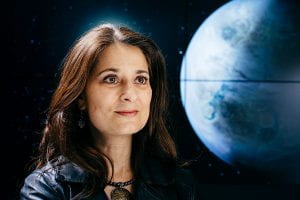The UC Santa Cruz Astrobiology Initiative launches in 2020
In the next decade, spacecraft will visit the watery worlds of our solar system equipped with instruments capable of detecting complex organic molecules. The most powerful telescopes in history will look through the atmospheres of exoplanets for the gasses created by living organisms.
UC Santa Cruz stands at the forefront of this endeavor, with faculty who are world leaders in the study of exoplanets, the origin of life, planetary science, and instrument development. UC Santa Cruz Astrobiology will continue its groundbreaking research while training diverse new generations of astrobiologists.
This effort is inherently interdisciplinary, demanding varied expertise. On a campus with a tradition of breaking barriers between academic disciplines, the humanities, social sciences, and the arts will play a central role, engaging the public in our discoveries and their societal implications. We invite you to join us on this great frontier of science and humanity.
Meet our Astrobiology team
In 2017, responding to discoveries made during Professor Natalie Batalha’s leadership of the Kepler Mission, Congress made the search for life beyond Earth a NASA objective. Now, Professor Batalha has organized a team of UC Santa Cruz experts to begin strategic planning, implementing pilot programs, laying the groundwork for new courses and research endeavors, and designing compelling public events. Our work will ensure humanity truly understands the knowledge that UC Santa Cruz Astrobiology is discovering.

Professor Batalha is the director of the Astrobiology Initiative. She is involved with the detection and characterization of planets orbiting other stars (exoplanets) with the goal of understanding and finding the most likely cradles of life. She also studies exoplanets as a population to understand their diversity.
Space & planetary experts
Jeffrey Chaffin, Physics (Grad Student)
Sandra Faber, Astronomy & Astrophysics
Jonathan Fortney, Astronomy & Astrophysics
Raja GuhaThakurta, Astronomy & Astrophysics
Philip Hinz, Astronomy & Astrophysics
Ruth Murray-Clay, Astronomy & Astrophysics
Francis Nimmo, Earth & Planetary Sciences
Joel Primack, Physics
Enrico Ramirez-Ruiz, Astronomy & Astrophysics
Andy Skemer, Astronomy & Astrophysics
David Smith, Physics
Myriam Telus, Earth & Planetary Sciences
Climate & life experts
David Deamer, Biomolecular Engineering
Andrew Fisher, Earth & Planetary Sciences
David Haussler, Biomolecular Engineering
Paul Koch, Earth & Planetary Sciences
Harry Noller, Molecular, Cell, & Developmental Biology
Adina Paytan, Institute of Marine Sciences
Chad Saltikov, Microbiology & Environmental Toxicology
William Scott, Chemistry & Biochemistry
Marilou Sison-Mangus, Ocean Sciences
Slawek Tulaczyk, Earth & Planetary Sciences
Jonathan Zehr, Ocean Sciences
Arts & humanities experts
Martin Devecka, Literature
Jennifer Parker, Art
Zac Zimmer, Literature

